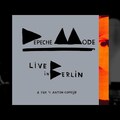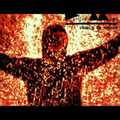Ben Hillier looks nice like that. He laughs all the time. Except that behind the screen of all this kindness English hides a monster resume work as structured professional training Companions. Among the victims of his fury, piochons U2, The Smashing Pumpkins, Suede, Editors, PVT, or The Horrors. A straw.
This year Hiller have produced its third album of rank for Depeche Mode. The thirteenth group. After Playing the Angel (2005) and Sounds of the Universe (2009), so Ben is back. Hard. But this time it is with the Flood mix, from Hillier as the collective 140dB. The SWAT team maneuvered everything she could to give birth to the famous Delta Machine from the ideas of Martin Gore and Dave Gahan. With Hillier, and rather than deal with all of his career and his vision of global production, we enter more specifically in the intricacies of making a disc one. Also a way for us to give a new face at the studio topic Obsküre Magazine.
Depeche Mode was looking through your continued cooperation in the studio?
Ben Hillier: Initially, Martin had not provided a lot of work on its preproduction. It was already very good. For these demos, he used a lot of modular synthesizers and hardware synths. On Sounds of the Universe, by comparison, had resorted to a lot of soft synths (note: software synthesizers). For Delta machine, when we started to discuss the making of the album, Martin aspired that we may preserve its material or say, its essence. He wanted to take the sounds created for demos and to ensure that the studio gives them clarity.
What is your opinion in the eternal analogue vs. digital debate for studio work?
On Delta machine, the entire album was recorded in digital. But if you would make a good record in these conditions, it is essential to have strong skills in technology. I think many digital recording systems sound pretty bad. They often lack depth and are not efficient enough in terms of rendering. Besides that, when you walk in analog mode, the process involves being very cautious. The analog can be a tedious side. The value of the report, however undeniable, is offset less than the digital handling. I love the look of analog, subject to devote to exercise strong discipline.
On Delta machine, most of the tracks was written by Martin, but again, Dave inlaid album from a personal creation. Do you see a different interaction between the group and producer, depending on who wrote what?
In some ways, yes. If we work on a song by Dave, there is a different dynamic. Dave feels far less concerned with what has been put on a demo and it's pretty comfortable in terms of production.
Martin led demos very complete, you say. Has this always been the case on other albums that DM has made with you?
His demos are still pretty fantastic in terms of musicality. Martin is really good in his field, he has ears unusual. After that, his strength is in writing that in his: He focuses less on pure made that the quality of what he writes. However, sometimes his demos sound so exceptional that step if the studio did for single vocation to finish things, and then get certainty in the final versions have nothing tempered the original substance (laughs). Moreover, if Martin is in a very clear vision of what he wants on a piece, it follows its path, regardless of outside opinion ... And in general, I must admit he's right. Then we have the satisfaction of finishing things together and ensure that the voice of Dave live his life inside, the whole works.
Delta Machine is also the story of a duo: Flood to the mix and you in production. Two aspects that can not be assimilated to one another. You two, what is more, are part of the collective 140dB. What interaction existed between Flood and when you work on the album?
Flood is a very old friend. This is an engineer and producer who has had some influence on my career. When it was discussed in the past to choose a person to mix the sound of DM, I mentioned his name, but the group did not want to do this â time. This time, Martin was tempted by the option. For him, Flood was a remedy and it has created an excellent environment. Flood and I know so well, we can combine serious and fun at work, while remaining frank vis-à-vis each other on what to do. He had a positive influence and I believe that together we pushed things further than had been done before with DM. Mix engineer is a very strange work, you know: you try to find the limit, how far you can push the project, and the border is sometimes blurred between the intention and confined to doing things in the best possible sound function. As a mix engineer, you can get ideas of production. They are not always welcome, but sometimes they are. With Flood, the rule was clear: it guarantees I said I listen to propose ideas that although likely to enter the field of production... provided he accepts himself that I reject (laughs)! It caused an exchange of points of view very promising.
What had brought Depeche Mode reject the presence of Flood on the previous two records?
I do not know, but I do not think the question is posed in terms of wanting or not wanting someone. Sonically speaking, the choice does not speak to them this time. They wanted something slightly different from what Flood was likely to bring. I must say that the records he developed a style that we all reach it and his is particularly known try. It corresponds or not to the expectations expressed.
Specifically, and in terms of pure studio work on Delta Machine, Flood and you were you present at the same time and continuously in the studio or was it a broken process, with moments of self-sufficiency for everyone?
It was a bit of a mix of the two situations you describe. At first we were in South America. Flood made the first mixes, but in London. Obviously, this distance has forced our absence to each other. Then approaching the end of the process, we found much more on studio set. Initially, I wanted to give free rein to Flood for experimentation. I wanted to see approve your content through the mixes, I take no position requires micro-management, in order to see where he headed up the pieces. Then really the end, I reviewed the work there reintegrating choices that I knew that the group held, at least for some titles. In sum, I have maximized his freedom at the beginning of the process, but Flood has been less on the end.
Delta Machine is made of fairly subtle modulations and variations. The course integrates the blues, as some discs DM tend to make the post-Violator period. Technological landscape may sometimes give the impression of a recess melodic. This is largely a false impression, because the disk actually develops its own effectiveness. His intentions are plural, Delta Machine must be won. How, from the point of view of the producer, the line is drawn? How to shape a vision of what should be the final shape?
There are two stages. Initially, demos inspire you something, a feeling of how things should sound in the end. Some sounds stand out, they can draw a fuel and for this reason, they offer you the marks. You feel, you know what will be an important outcome in the studio. The second thing is this aesthetic projection that you would like to achieve from the demos. This second part of the path is difficult and interesting because it's time to meet the intentions. It should provide a projection that the group is inspiring his side. It's time to offer ideas to test. This experiment echoed what has been inspired by the demos, it's a whole finally. One of the key areas of Delta machine, the "line" of which you speak, it is also without doubt the will that we had to maintain the quality and clarity of sound.
Some titles have they a problem?
There has been a few where I told the group again, neither more nor less (laughs). Not that the versions were bad, they were good, but what I told them, in essence, is: "OK, this is certainly good, but not as much as it could under demos."Depeche Mode is a band out of the ordinary. For others, I could accept this result then, but for them not. The level of demand is the potential that is awarded.
This research clearly suggests that guided the process envelope and resonance. But it is how you get to things, the way. However, Martin has certainly developed a strong vision of what the music should be in fine. Do you think he has simultaneously grown acceptance of the artistic direction that may involve the production?
Hmm... In many ways, with DM, the mode of production seems unusual. With a large number of groups, the noise spectrum is defined: the musicians play their parts and you have a palette of sounds at your disposal, you can work. There is a bit the opposite palette can open up to infinity. Synthesizers, guitars, live drums or electronic. The field is vast. Everything is open, especially with DM process is collaborative. What I mean is that you have to get to work with them, to the point where you must also provide a source of inspiration, not merely repeat demos just trying to make you better. It would not make sense to talk about how their work. Here it is a question of extracting DNA demos disc, to develop and implement the ideas contained in germ. Sometimes you bring titles too far and the group feels. It is he who asks you to come back where you came from and you stop at a certain stage. We spent a lot of time on Delta Machine and one of the reasons explaining this volume is experimentation that we have allowed ourselves. Is a liberating experience, but time-consuming process. The balance point is in a shared artistic vision: the producer does not switch to a fascist material processing (laughs)!
The studio is where we will look for technical, hardware, the resonance of a room ... For Delta machine, you used two different studios. Why?
Martin lives in Santa Barbara with his family, Dave is in New York. We go to both cities to make their lives easier and it is even more important that the experience is likely to last several mols. They are both present in the studio all the time, but do not want to cut their over long periods. That is the practical and personal appearance. New York will also find many studios and you have an impressive choice about the environment that you will have to register. What we have done as the last three albums, is that we built a mobile studio that follows us everywhere, wherever we sat. And we know very well the studio in Santa Barbara, this is a great area where we set up our equipment as we understand it. Whenever we attack an album, besides, we evolve our studio configuration. It is at the heart of the approach is the core. Delta Machine for example, we had to adapt to the material used by Martin, the famous analog modular synths and that he has collected the last three or four years. We had to limit the material (laughs).
What is certain overall, is that work on a disk means to create or find a supportive environment. Depending on where you register, you could feel different moods at Dave or Martin?
Probably, yes, and it plays on the creative dynamic. For example, if you work in a place not too far from the home of Martin, he is more relaxed, more open to what you tell him because he is in an environment he knows. New York by cons, Martin has nothing else to do than record. He then concentrated very hard on the job. This is a good balance in the end, it works very well for him and Dave.
The good news is that everyone can be a gentleman to another, even over long periods of time (laughs).
You do not think so right! On a disc as long to do that Delta machine, you should not ignore the impact of external factors on the process. Keep the group in a state of serenity and happiness makes a big difference with a context in which the musicians end up depressed because they miss people they love (laughs).
Some of the titles that you have lying in studio Delta Machine not on the regular version of the album, but on B-sides or on the second CD of the deluxe edition. The producer is he one of those who accompanied the group or management in sorting?
Yes, it can take part. I always try to get the group to achieve more titles than it takes to be an album. li is very good, I think, contrary to popular belief, having a redundant element in all that you just created. It should obviously end up together the essential, but allowing you the element of repetition, redundancy, you removed the pressure that could affect work limited to titles "priority". These "other" songs offer a complementary angle, the fans love this creative experiment considered "secondary". I understand even better that it is sometimes it happens that the strongest experimental support. It is realized in their spacing as the final tracklisting leaves an additional creative margin.
It seems that Dave has said that Delta Machine is the final chapter of the trilogy you have made together. Does this mean that you now know that you will not work again with Depeche Mode, at least in the short term?
I do not know. To be honest, we have not talked about it (smile). Personally, I already extraordinary they asked me to do three discs on with them as they had never made this choice before, continuity in production. I'm not sure, also, that they are already planning on the next album.
Some say Delta Machine will be the last rock history that is full of resurrections said.
(Laughter) Yeah, who knows what will happen? I'm sure they will continue to make music, it is the framework that I know. Martin and Dave were happy to do this record, that I know. At the same time, they also aspire solo. A range of possibilities opens today.
SYNTH POP SCALABLE
The choice can be defended, but it is unclear whether Depeche Mode has made the right by saving the person of the Flood mix of the two previous albums, products like the latter by Ben Hillier.
Flood him as from the collective 140dB and it certainly is not for nothing. This time, the diabolical pair â maneuver and for the better, serving Gore, Gahan & co. The result, in the sound aesthetics at least, is incommensurate with the two previous studio album Playing the Angel (melodies rather strong, flat production) and Sounds of the Universe (experimental inclination, nerve a little relaxed). With a clarity and precision that lack both predecessors, Delta Machine has sometimes been criticized, at its output, a little immediate melodicity (DM is doomed to be a single machine?). He said that developing a curvy, disparate and quilted for moments of pure energy. The texts are not necessarily the most interesting career, but the songs work well, you earn gradually and develop their small orchestral science (Welcome to my World). They contain their bluesy temptation, no wonder (Angel, Goodbye), sometimes opt for the German electro feeling or more abstract (My Little Universe). Here and there, ecstasy pills for those who want to enjoy (Soft Touch / Raw Nerve, Secret to the End, "Alone, Soothe my Soul). Ecstasy yes, but not 100%. The songs are not all good (Heaven is a single way and let Disposal Should be higher and Slow, low tempo bluesy academic strand). Taken as a whole, however, Delta Machine advance serious arguments made meticulous slight acidulation (Broken) mélodicité. A good year and that even without becoming our new Violator offers ample work best view and perhaps the darkest since 1997.
Emmanuël Hennequin
75%





